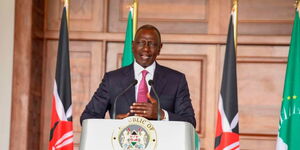The Supreme Court of Friday, June 23, issued a landmark ruling on the salaries of the members of the National Police Service.
A seven-judge bench dismissed the appeal of two police officers seeking compensation for being discriminated against after graduating with university degrees.
The duo accused the National Police Service Commission of failing to upgrade their salaries to the rank of graduate officers.
"We accordingly dismiss this appeal for want of merit but stress that police officers who are holders of degrees from recognised universities or other such institutions must follow the law and the guidelines, by submitting their applications for consideration by the authorised body to grant either a promotion or a reward under the horizontal career development scheme," The Supreme Court ordered.
In particular, the case strode from the Employment and Labour Relations Court (ELRC)to the Court of Appeal before the Supreme Court, sealed its fate.
At the Supreme Court, the judges reviewed the decision of the Court of Appeal which had dismissed the Employment and Labour Relations Court's judgment that had granted the officers all the orders sought, including a pay rise to Job Group J, like other graduate police officers who share salaries with Inspectors of Police.
The Supreme Court also determined if the Court of Appeal erred in finding that the officers could only have been given a pay rise with an express opinion of the Salaries and Remuneration Commission (SRC), which the Appellate Court noted as a mandatory obligation in the circumstances of the dispute.
"The Court has jurisdiction to determine the appeal. From the ELRC to the Supreme Court, the dispute has revolved around the interpretation and application of Articles 27, 41 and 47 of the Constitution," Supreme Court stated.
In their determination, the seven-judge bench acknowledged a circular that was issued on January 14, 1969, in which the then Police Commissioner granted graduate police officers in the rank of constable a salary higher than their counterparts who were not graduates.
Over time, this practice developed into a policy within the police force as evinced by a subsequent letter from the Permanent Secretary in Charge of Personnel Management dated July 26, 1995.
In that letter, the permanent secretary directed that Graduate Police Constables be differentiated and designated as University Graduate Constables and placed in Job Group J.
The Appellants were police constables serving in either the Administration Police Service (APS) or the Kenya Police Service (KPS), respectively having been recruited on various dates between 2007 and 2016.
While in service, they enrolled and completed university studies attaining bachelor's degrees in different fields. On the basis of the circular of 1969 and the letter of 1995, the appellants also relied on a press release of March 19, 2018, by the then Chairperson of the NPSC, Johnston Kavuludi.
NPSC confirmed that payment of special salaries (Job Group J) to graduate police officers in the National Police Service was legally protected and was provided for in the service policy guidelines, as such, they claimed to have had a legitimate expectation to be placed in Job Group J.
However, their expectations failed to materialise, to which, they filed a petition before the Employment and Labour Relations Court (ELRC) claiming that the NPSC and the Inspector General had been receiving degree certificates from graduate police constables in the service but had selectively and capriciously upgraded some to Job Group J and ignored others with similar qualifications.
According to them, this amounted to preferential treatment in contravention of Articles 10, 27, 41(1), 43, 47, and 232 of the Constitution.
The ELRC allowed their Petition on the variance of pay slips belonging to officers designated as Graduate Police Constables exhibited by the appellants showing a difference in their earnings from those of the appellants, yet both categories were in the rank of police constables.
The court also found that the press release by the NPSC's chairperson set out the prevailing policy on the graduate constables and that the appellants were entitled to benefit from the policy.
The court, however, rejected the appellants' claim of discrimination. Ultimately, the court declared that the respondents' conduct and action amounted to a denial, violation, infringement and a threat to a violation of the fundamental rights and freedoms of the appellants.
It was on this basis that ELRC issued an order of mandamus directing the NPSC and Inspector General to pay all graduate constables salary equivalent to that of an inspector of police (Job Group J) in accordance with the prevailing policy and as clarified in the press release.
Aggrieved by this decision, the respondents, the National Police Service and the Inspector General of Police filed an appeal. The Court of Appeal held that although there was an express promise in the circular of 1969 and letter of 1995, upon promulgation of the Constitution 2010 and the enactment of the NPSC Act No. 30 of 2011, there was a shift.
That shift birthed the NPSC and Inspector General under Articles 245 and 246 with further provisions in the National Police Service Commission (NPSC Act) and National Police Service (NPS Act).
Further, the NPSC Act requires that only with the advice of the Salaries and Remuneration Commission (SRC), can the NPSC determine the appropriate remuneration and benefits for the police service and staff of the NPSC.
It follows from these developments that, neither the press release nor the letter and circular in question could supersede the provisions of the constitution and the law.
The court, for this reason, held that the contents of the press release did not give the appellants any legitimate expectation. The court found merit in the appeal and allowed it, setting aside the judgment of the ELRC in its entirety.
At the Supreme Court, once again, the seven-judge bench found that the parties in the case could not rely on the circular of 1969 and the letter of 1995 as the basis of their legitimate expectation well after the promulgation of the constitution, the establishment of the NPSC and the enactment of the NPS Act and the NPSC Act.
The Supreme Court ordered that the promotion and renomination of police officers must be guided by the Recruitment and Appointment Regulations, the Promotion Regulations and the Career Progression Guidelines.
"The press release could similarly not form the basis of legitimate expectation as it was simply a clarification of a specific situation. It restated the requirements for consideration for the promotion of graduate constables," The Supreme Court observed.
Further, the Apex court found that under Section 10(1)(b) of the NPSC Act, the NPSC can determine the appropriate remuneration and benefits for the National Police Service but only with the advice of the SRC.
"The respondents cannot be ordered or directed to interfere with the appellants' salaries without involving the SRC," Supreme Court ordered.
The salaries of graduate police officers vary depending on their rank and experience. However, as a general rule, graduate police officers earn more than their non-graduate counterparts.












